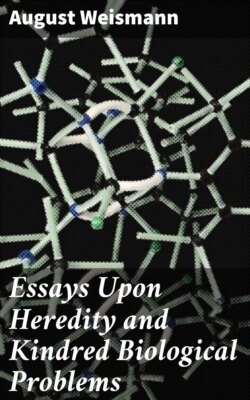Читать книгу Essays Upon Heredity and Kindred Biological Problems - Weismann August - Страница 22
На сайте Литреса книга снята с продажи.
Footnotes for Essay II.
ОглавлениеTable of Contents
33. Pflüger, ‘Ueber den Einfluss der Schwerkraft auf die Theilung der Zellen und auf die Entwicklung des Embryo,’ Arch. f. Physiol. Bd. XXXII. p. 68, 1883.
34. Victor Hensen in his ‘Physiologie der Zeugung,’ Leipzig, 1881, p. 216.
35. That is for the preservation of its life.
36. Compare Weismann, ‘Die Entstehung der Sexualzellen bei den Hydromedusen,’ Jena, 1883.
37. It is doubtful whether Magosphaera should be looked upon as a mature form; but nothing hinders us from believing that species have lived, and are still living, in which the ciliated sphere has held together until the encystment, that is the reproduction, of the constituent single cells.
38. Or is an exception perhaps afforded by the nutritive cells of the egg, which occur in many animals?
39. Or more precisely, they must give up as many molecules as would correspond to the number of the kind of cell in question found in the mature organism.
40. See Darwin, ‘The Variation of Animals and Plants under Domestication,’ 1875, vol. ii. chapter xxvii. pp. 349-399.
41. To this class of phenomena of course belong those acts of will which call forth the functional activity of certain groups of cells. It is quite clear that such impulses do not originate in the constitution of the tissue in question, but are due to the operation of external causes. The activity does not arise directly from any natural disposition of the germ, but is the result of accidental external impressions. A domesticated duck uses its legs in a different manner from, and more frequently than a wild duck, but such functional changes are the consequence of changed external conditions, and are not due to the constitution of the germ.
42. Upon this subject Pflüger states—‘I have made myself accurately acquainted with all facts which are supposed to prove the inheritance of acquired characters,—that is of characters which are not due to the peculiar organization of the ovum and spermatozoon from which the individual is formed, but which follow from the incidence of accidental external influences upon the organism at any time in its life. Not one of these facts can be accepted as a proof of the transmission of acquired characters.’ l. c. p. 68.
43. ‘Physiologie der Zeugung.’
44. See ‘Ueber die Uebung,’ Berlin, 1881.
45. This principle was, I believe, first pointed out by Seidlitz. Compare Seidlitz, ‘Die Darwin’sche Theorie,’ Leipzig, 1875, p. 198.
46. W. Roux, ‘Der Kampf der Theile im Organismus,’ Leipzig, 1881.
47. Compare Born in ‘Zoolog. Anzeiger,’ 1883, No. 150, p. 537.
48. O. C. Marsh, ‘Odontornithes, a Monograph on the extinct toothed Birds of North America,’ Washington, 1880.
49. C. Darwin, ‘Variation of Animals and Plants under Domestication.’ Vol. I.
50. Compare ‘Der thierische Wille,’ Leipzig, 1880.
51. Steller’s interesting account of the Sea-cow (Rhytina Stelleri) proves that this suggestion is valid. This large mammal was living in great numbers in Behring Strait at the end of the last century, but has since been entirely exterminated by man. Steller, who was compelled by shipwreck to remain in the locality for a whole year, tells us that the animals were at first without any fear of man, so that they could be approached in boats and could thus be killed. After a few months however the survivors became wary, and did not allow Steller’s men to approach them, so that they were difficult to catch.—A. W., 1888.
52. Compare Schneider, ‘Der thierische Wille.’
53. [The author refers to the Academy of Arts at Munich. S. S.]
54. Compare Darwin’s ‘Descent of Man.’
55. ‘Studien zur Descendenztheorie, I. Ueber den Saison-Dimorphismus der Schmetterlinge.’ Leipzig, 1875. English edition translated and edited by Professor Meldola, ‘Studies in the Theory of Descent,’ Part I.
56. The colours which have been called forth by sexual selection must also be included here.
57. Wilhelm Roux, ‘Der Kampf der Theile im Organismus.’ Leipzig, 1881.
58. Consult ‘Studien zur Descendenztheorie, IV. Über die mechanische Auffassung der Natur,’ p. 303, etc. Translated and edited by Professor Meldola; see ‘Studies in the Theory of Descent,’ p. 677, &c.
III.
LIFE AND DEATH.
1883.
